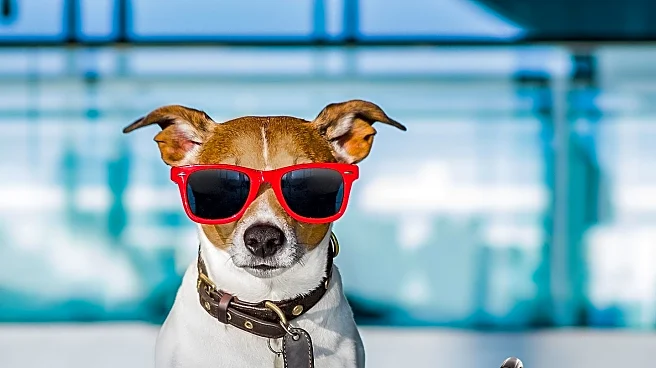What's Happening?
Rome's Fiumicino International Airport has launched a dog hotel, Dog Relais, to simplify travel for pet owners. This facility, one of the first of its kind at a major European airport, offers various services to ensure the comfort and care of dogs while their owners travel. Basic rooms are priced at approximately €40 ($47) and include amenities such as temperature-controlled floors and private gardens. Additional services include grooming, aromatherapy, and muscle-relaxing treatments. The hotel also provides daycare services for local dog owners. The initiative follows a similar project at Frankfurt Airport and aims to enhance the travel experience for passengers with pets.
Why It's Important?
The opening of Dog Relais at Rome's airport represents a significant development in travel services, catering specifically to pet owners. This initiative addresses the logistical challenges faced by travelers who own pets, offering peace of mind and convenience. By providing a dedicated space for dogs, the airport enhances its service offerings, potentially attracting more pet-owning travelers. This move also reflects a growing trend in the travel industry to accommodate the needs of pet owners, which could influence other airports to adopt similar facilities. The service not only benefits travelers but also local residents who require daycare for their pets.
What's Next?
The dog hotel has already seen high occupancy rates, indicating strong demand for such services. As Italy's commercial aviation authority has recently allowed large dogs to travel in plane cabins for domestic flights, this could further increase the popularity of the dog hotel. The first flight under the new rules is scheduled for September 23. The success of Dog Relais may encourage other airports to consider similar facilities, potentially leading to a broader adoption of pet-friendly travel services across Europe and beyond.
Beyond the Headlines
The introduction of pet-friendly services at airports highlights a shift towards more inclusive and accommodating travel experiences. This development may prompt discussions on the ethical treatment of animals in travel settings and encourage further innovations in pet care services. Additionally, it reflects changing societal attitudes towards pets, recognizing them as integral members of families and deserving of specialized care during travel.











